Can I feed my cat chicken everyday? As true carnivores, cats indeed require animal protein in their diet for optimal health. This article will guide you through what you need to know about the pros, cons, and precautions when feeding your pet chicken regularly.
Read on and debunk some myths while clarifying facts about cats and chickens!
Key Takeaways
- Cats are obligate carnivores and require animal protein in their diet, making chicken a suitable option for feeding them.
- Feeding your cat cooked chicken can improve coat health, promote lean muscle development, and provide essential nutrients for overall well-being.
- It is important to ensure that the chicken is cooked properly to eliminate harmful bacteria, and variety should be incorporated into their diet by alternating between different meats.
- Homemade food with chicken can be a beneficial addition to your cat’s diet but should not replace regular balanced meals. Providing variety and meeting all nutritional requirements is crucial for keeping your cat healthy.
Understanding Cats’ Dietary Needs
Domestic cats, descendants of the African wildcat (Felis silvestris lybica), are obligate carnivores. This means their primary dietary need is animal protein from sources like chicken or fish, and they cannot survive on a diet devoid of it.
Unlike humans, who can acquire necessary nutrients from both plant and animal sources, cats draw most of their essential nutrients such as taurine, arginine, vitamins B1, B2, B5, B6, and vitamin C primarily from meat.
Each nutrient plays a vital role in maintaining cat health. For example, taurine aids eyesight and heart function, while arginine helps dispose of waste ammonia from the body. Meat also provides cats with the iron needed to produce hemoglobin – lack thereof can lead to iron-deficiency anemia.
It’s not enough to feed your feline friend lean protein alone, though; they require a balanced diet that includes other meats like turkey or beef alternating with chicken for variety.
Understandably so, considering commercial foods often use different types of meat bases combined for optimal nutrition balance.
Moreover, be mindful when feeding them “human food.” Always ensure it’s safe for consumption by checking against lists published by credible pet care bodies limiting exposure to potential choking hazards.
In sum: Cats need a varied diet anchored around quality animal proteins supplemented sparingly with certain human-safe foods to meet their unique nutritional requirements and fully function as healthy pets!
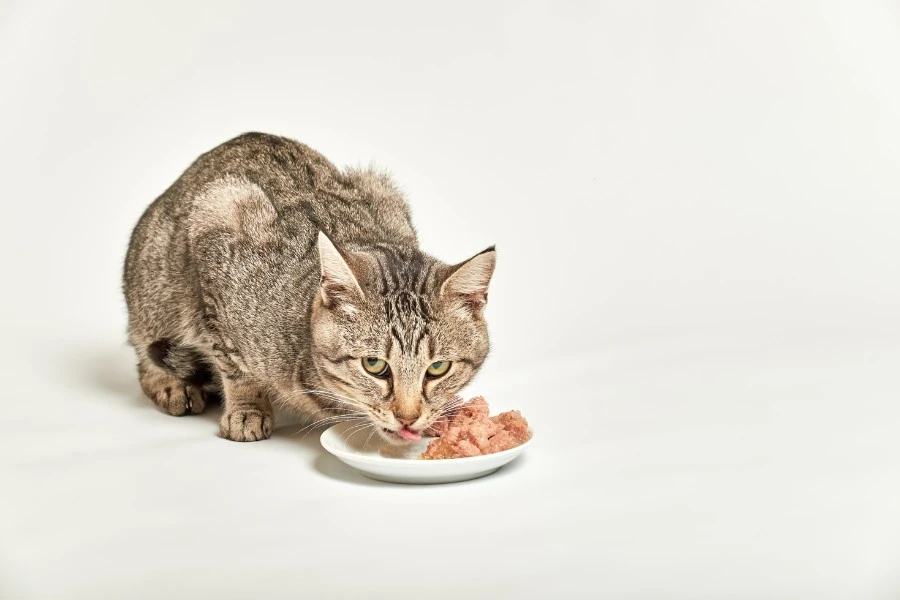
Health Benefits of Feeding Your Cat Chicken
Feeding your cat chicken has several health benefits, such as improving coat health, promoting lean muscle development, and providing essential nutrients for overall well-being.
Improved coat health
Feeding your cat chicken could do wonders for their coat health. This is large because chicken is a rich source of lean protein, vital amino acids, and vitamin B6 – all potent nutrients with known benefits for our health.
For instance, proteins are essential in promoting strong and healthy hair follicles. Amino acids are the building blocks of these proteins and contribute immensely to maintaining the shine and texture of your furry friend’s coat.
The selenium in chicken also enhances your cat’s skin health, directly impacting its coat quality. Specifically, it aids in reducing inflammation and fighting against environmental damage that can lead to dullness or dryness in cats’ fur coats.
Hence incorporating moderate amounts of cooked boneless chicken into your pet-formulated meals could help yield a sleeker fuzzier feline!
Lean Muscle Development
Lean protein, like that found in chicken breast, plays a crucial role in a cat’s diet. It is an essential building block for developing and maintaining lean body mass.
Cats are carnivores; hence their bodies are well-equipped to metabolize animal protein efficiently. A diet enriched with chicken provides the amino acids needed for your feline to build strong muscles while preserving overall wellness.
However, creating a balanced meal isn’t just about loading up on chicken – variety is vital! Mixing things up by rotating other meats, such as turkey or lamb, into their feeding routine regularly is beneficial.
This way, not only does your pet get a pleasant palate change, but it also ensures wholesome nutritional supplementation beyond what just chicken can provide.
Essential nutrients
Cats require essential nutrients to maintain their overall health and well-being. Chicken is a great source of these vital nutrients for our feline friends. It is packed with important minerals like selenium and phosphorus, which support various bodily functions such as maintaining healthy bones and teeth.
Additionally, chicken is rich in vitamin B6, which helps cats produce energy and support their immune system. These essential nutrients can contribute to your cat’s overall vitality and ensure they get the proper nutrition they need to thrive.
Can Cats Eat Raw Chicken?
Raw chicken is a controversial topic when it comes to feeding cats. While cats are natural carnivores and their ancestors in the wild would consume raw meat, it does not mean that raw chicken is safe for them.
Raw chicken may contain harmful bacteria such as E. coli and salmonella, which can cause cat food poisoning. These bacteria pose serious health risks, leading to diarrhea, vomiting, and dehydration.
Cooking meat, including chicken, helps eliminate these harmful bacteria and makes it safe for consumption by cats. It is important to cook the chicken thoroughly without any seasonings or additives that might be toxic to cats.
By cooking the chicken properly, you ensure that your cat gets all of the nutritional benefits without putting their health at risk.
Feeding raw chicken from grocery stores should be avoided as it might come with additional risks due to poor handling practices or potential contamination during processing. It’s always best to consult with a veterinarian before making any changes to your cat’s diet or introducing new foods such as raw meat.
Remember that while small quantities of cooked chicken can be a healthy addition to your cat’s diet as an occasional treat or supplement, it should never replace their regular balanced meals.
Variety is key when it comes to providing a nutritious diet for your feline friend; consider alternating between different meats like turkey, fish, or beef alongside cooked boneless Chicken breast cuts.
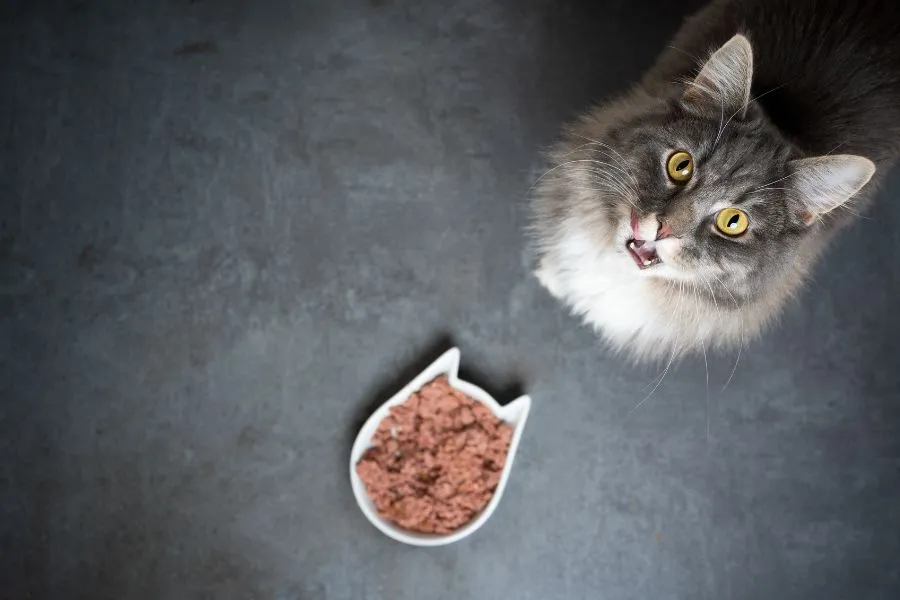
The Pros and Cons of Feeding Cats Cooked Chicken
Feeding your cat cooked chicken can have both advantages and disadvantages. It’s crucial to understand both sides to make an informed decision about your cat’s diet.
Cooked chicken is a rich source of lean protein, essential for your cat’s health and muscle development. Your cat might get tired of eating chicken every day. Introducing variety with other meats can help.
Chicken contains beneficial selenium, phosphorus, and vitamin B6, providing key nutrients for your cat. Feeding only chicken may not provide a balanced diet for your cat, which should include other nutrients and vitamins.
Cooked chicken, when prepared properly, is safe for cats and reduces the risk of foodborne illnesses. Cooked chicken from grocery stores may contain additives, salts, or spices that are not safe for cats.
Serving cooked, shredded chicken can encourage fussy eaters to consume their meals. Feeding your cat only chicken may lead to nutritional deficiencies if not supplemented properly.
Feeding your cat cooked chicken can be a healthy addition to their diet, but it’s essential to make sure it’s prepared correctly and served in moderation.
Homemade Food for Cats: The Role of Chicken
Homemade food can be a great option for cats, especially when it comes to incorporating chicken into their diet. Chicken is an excellent source of animal protein that helps fulfill the carnivorous nature of cats.
It provides essential nutrients like taurine, which is crucial for maintaining healthy eyesight and heart function in felines.
When preparing homemade cat food with chicken, it’s important to use plain cooked chicken without any seasoning or added ingredients. Boneless chicken breast is the best choice as it contains lean protein and is low in fat and salt.
By incorporating fresh chicken into your cat’s diet, you can ensure they receive a balanced meal that supports their growth and development.
However, it’s essential to keep in mind that feeding your cat exclusively homemade meals may not provide all the necessary nutrients they need. Cats require a diverse range of vitamins and minerals found in other types of meat like turkey, fish, or beef.
To ensure your cat gets a well-rounded diet, consider rotating different meats throughout the week or supplementing their meals with high-quality commercial cat food formulated specifically for their needs.
Overall, homemade food with chicken can be a beneficial addition to your cat’s diet but should not replace regular balanced meals. Providing variety and ensuring all nutritional requirements are met will help keep your furry friend happy and healthy.
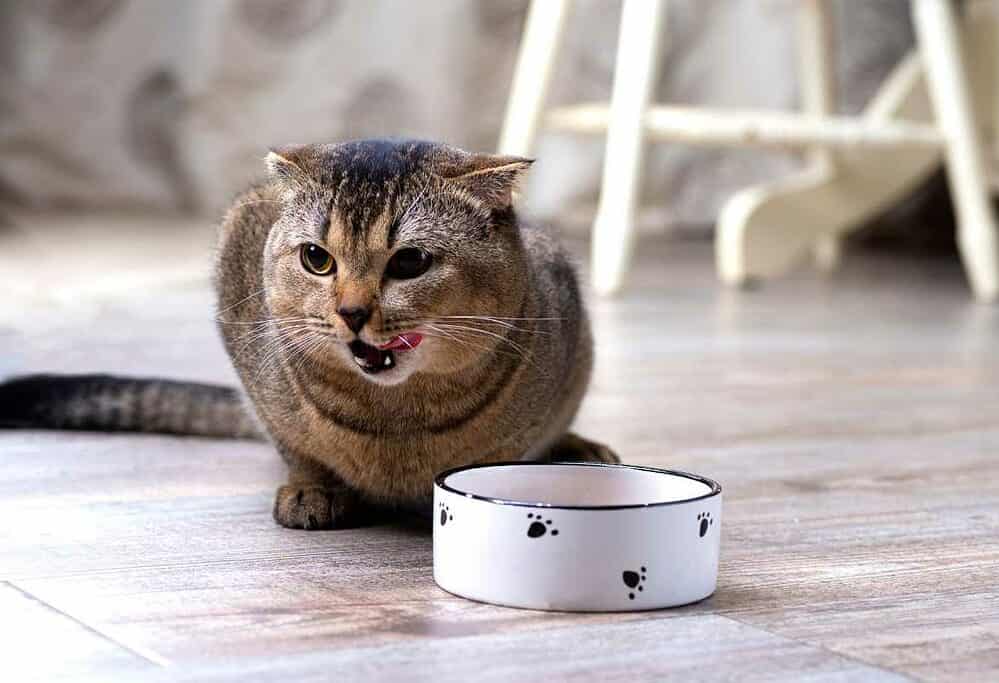
How to Make Cat Gravy with Chicken
To make a delicious cat gravy with chicken, follow these simple steps:
- Start by cooking boneless chicken breast until it is fully cooked and tender. Make sure to remove any skin or bones.
- Once the chicken is cooked, allow it to cool completely before handling. Then, shred the chicken into small, bite-sized pieces using a fork or your hands.
- In a small saucepan, combine the shredded chicken with low-sodium or homemade chicken broth. Use enough broth to create a gravy-like consistency.
- Add any additional ingredients your cat enjoys, and they are safe for feline consumption. Consider adding finely chopped vegetables like carrots or peas for added nutrients.
- Bring the mixture to a gentle boil over medium heat, stirring frequently to prevent sticking or burning.
- Reduce the heat to low and simmer for about 10 minutes, allowing the flavors to meld together and the gravy to thicken slightly.
- Remove the pan from heat and let the gravy cool completely before serving it to your cat.
Mixing Wet and Dry Cat Food: Is Chicken a Good Option?
When it comes to mixing wet and dry cat food, chicken is an excellent option. Cats are obligate carnivores, meaning they require animal protein for their health. Chicken is a great source of lean protein for cats, helping to strengthen their muscles and promote weight gain if needed.
It also contains essential nutrients like selenium, phosphorus, and vitamin B6, contributing to overall feline health.
Mixing wet and dry cat food can benefit both types of food. Wet food provides hydration and can be more palatable for picky eaters or those with dental issues. Dry kibble helps maintain dental health by promoting chewing and reducing tartar buildup.
Incorporating chicken into your cat’s mixed diet provides them with the necessary nutrients while adding variety to their meals. Remember that choosing high-quality pet-formulated options is important and ensuring any homemade recipes are nutritionally balanced.
To ensure a healthy diet for your cat, consider rotating proteins such as turkey or fish and chicken in their meals. This will help prevent sensitivities and provide a wider range of vitamins and minerals essential for growth and development.
In conclusion, mixing wet and dry cat food with the inclusion of chicken is a smart choice that allows you to meet your feline friend’s nutritional needs while keeping mealtime interesting.
Just remember always to choose high-quality options formulated specifically for cats!
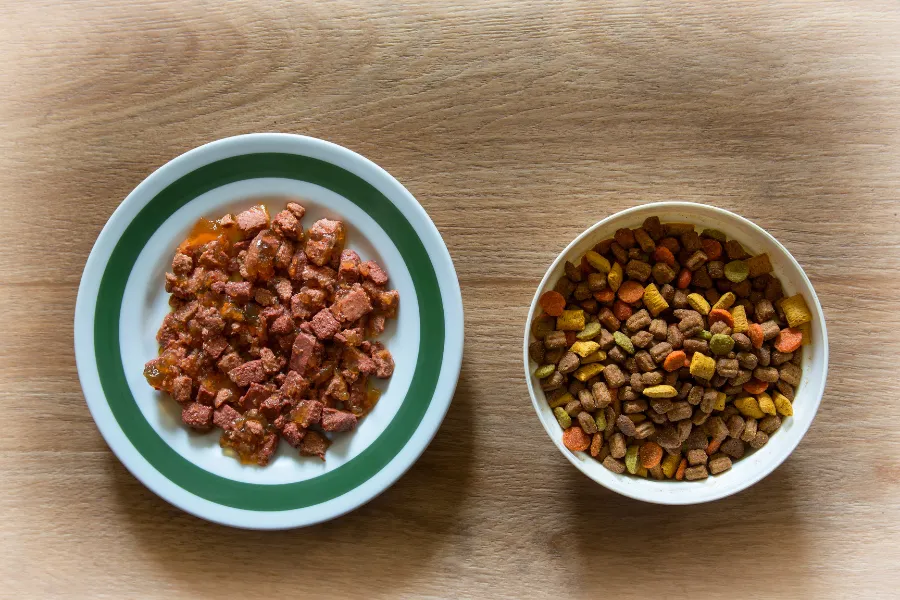
Best Cat Food for Sensitive Stomach: Can Chicken be Included?
For cats with sensitive stomachs, finding the right food can be a challenge. Many cat owners wonder if a chicken is a good option for their feline friends with delicate digestive systems.
The answer is it depends. Some cats with sensitive stomachs may tolerate chicken well, while others may not. Chicken is generally considered a lean protein source that can be easier to digest compared to other meats.
It provides essential nutrients like selenium and vitamin B6, which are beneficial for overall health. However, some cats may have allergies or sensitivities to chicken proteins, leading to digestive issues such as vomiting or diarrhea.
If you suspect your cat has a sensitive stomach but want to include chicken in their diet, it’s best to introduce it gradually and in small amounts. Observe how your cat responds after consuming chicken. If they experience any adverse reactions like upset stomach or allergic symptoms (itching, excessive grooming), it’s advisable to avoid feeding them chicken altogether.
Remember that every cat is different, and what works for one might not work for another. If your cat has ongoing digestive issues or sensitivities despite trying various diets, including chicken-based ones, consulting with a veterinarian specializing in feline nutrition would be helpful in determining the best course of action to keep your fur baby happy and healthy.
Alternatives to Chicken in a Cat’s Diet
Looking for alternatives to chicken in your cat’s diet? Discover other meat sources and commercial cat food options that can provide a balanced and nutritious meal for your feline companion.
Read more to explore the best options for your cat’s unique dietary needs.
Other Meat Sources
Cats require a variety of meat sources in their diet to ensure they receive all the necessary nutrients. In addition to chicken, here are some other meat options that can be included in a cat’s diet:
- Turkey: Like chicken, turkey is a great source of lean protein for cats. It can be cooked and served without the skin or bones.
- Fish: Many cats enjoy fish, such as salmon or tuna. However, it’s important to note that fish should be cooked and served in moderation due to its high levels of mercury.
- Beef: Lean cuts of beef can also be given to cats as an alternative to chicken. Remove any excess fat and cook it thoroughly before serving.
- Lamb: Lamb is another option that provides protein for cats. It should be boneless and cooked well to avoid any digestive issues.
- Liver: Feeding cats small amounts of liver can provide them with essential vitamins and minerals. However, it should only be given occasionally due to its high vitamin A content.
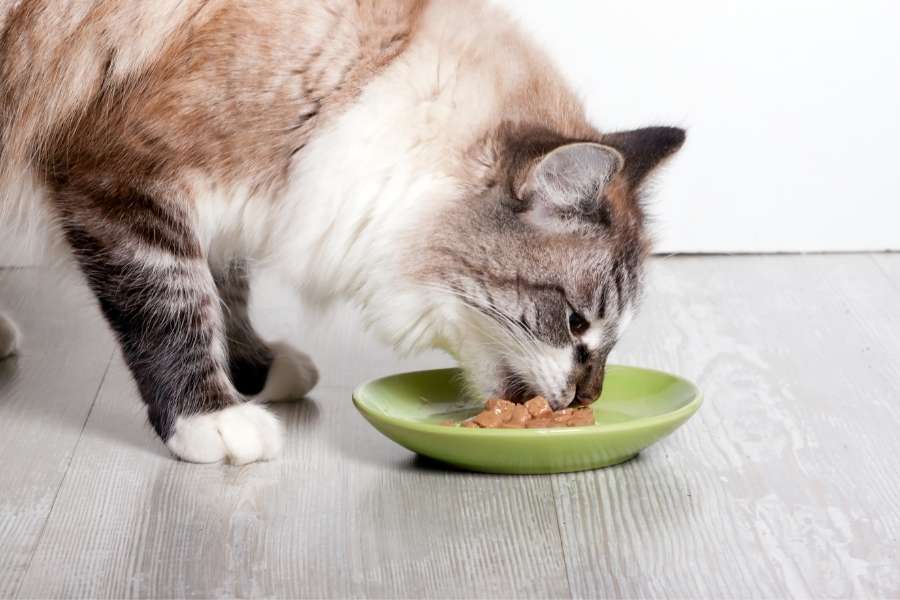
Commercial Cat Food
Commercial cat food is a convenient option for cat owners who want to ensure their feline friends receive a balanced and nutritious diet. Here are some key facts about commercial cat food:
- Commercial cat food is specifically formulated to meet the nutritional needs of cats, including essential vitamins, minerals, and amino acids.
- It often contains a mix of animal proteins, such as chicken, turkey, fish, or beef.
- Many commercial cat foods come in both dry and wet forms, allowing cat owners to choose based on their cat’s preferences and dietary needs.
- Wet cat food typically has a higher moisture content, which can help keep cats hydrated and promote healthy urinary tract function.
- Dry cat food is often more convenient for pet owners and can help maintain dental health by reducing plaque buildup.
- Premium brands of commercial cat food are designed to provide optimal nutrition for cats at different life stages, such as kitten-specific formulas or senior formulas.
- When choosing a commercial cat food brand, it’s important to look for ones that use high-quality ingredients without fillers or artificial additives.
- Reading the ingredient labels can help identify whether the product contains real meat sources or mostly fillers like grains or by-products.
Bland Diet for Cats: Can Chicken be a Part?
A bland diet can be beneficial for cats experiencing digestive issues or recovering from an illness. Chicken is often included in a bland diet for cats due to its mild flavor and easy digestibility.
Cooked, boneless chicken can provide the necessary protein and nutrients needed in a cat’s diet without causing further irritation to the digestive system. It is important, however, to avoid seasoning or using any ingredients that may be harmful to cats, such as onions, garlic, or herbs.
Offering plain cooked chicken alongside other easily digestible foods like boiled rice or vegetables can help soothe your cat’s stomach and aid in its recovery process. Remember that consulting with your veterinarian before making any significant changes to your cat’s diet is always recommended.
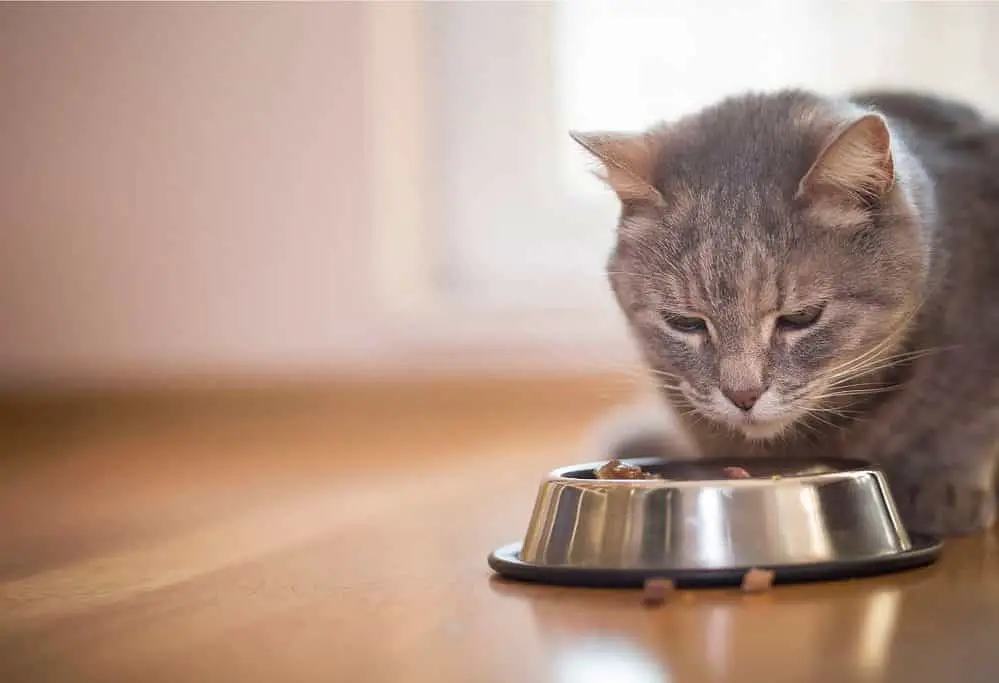
Frequently Asked Questions
- Can cats eat chicken bones?
- Are there any risks associated with feeding cats raw chicken?
- What should I do if my cat develops digestive issues after eating chicken?
- How often should I feed my cat chicken as part of their diet?
- Can cats have chicken skin?
- Should I remove all the fat from the cooked chicken before feeding it to my cat?
- Is it safe to give my cat flavored chicken, such as BBQ or spicy seasonings?
- Can I feed my cat a 100% boiled chicken diet?
- What are some alternative meat sources if my cat doesn’t like or can’t have chicken?
- Can cats eat organs such as liver along with chicken meat?
- What vitamins and minerals does chicken provide for cats?
- Can feeding my cat too much chicken lead to obesity?
Conclusion
In conclusion, while it’s safe to feed your cat chicken as part of a balanced diet, it’s not recommended to feed them chicken every day. Cats need a variety of nutrients from different protein sources, so incorporating other meats like turkey, fish, or beef is essential for their overall health.
Remember to cook the chicken thoroughly and remove any bones before serving it to your feline friend. Always consult with your veterinarian about your cat’s specific dietary needs and ensure they have a well-rounded meal plan for optimal health.
